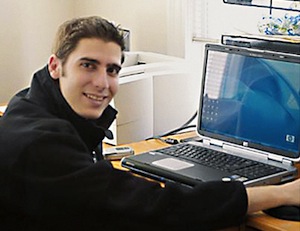
Saverin didn’t comment on The Social Network until today, when he published a short op-ed on the CNBC website. Anyone hoping for juicy commentary will be disappointed, however. For the most part, the article is a bland endorsement of startups — the only reference we get to any drama is the acknowledgment that creativity and entrepreneurship can be “complicated, difficult or tortured.”
[aditude-amp id="flyingcarpet" targeting='{"env":"staging","page_type":"article","post_id":220530,"post_type":"story","post_chan":"none","tags":null,"ai":false,"category":"none","all_categories":"business,media,social,","session":"D"}']Heck, if you didn’t know the story already, nothing in this article suggests that Zuckerberg and Saverin have fallen out.
Still, Saverin weighs-in very briefly on the movie’s accuracy. He writes:
AI Weekly
The must-read newsletter for AI and Big Data industry written by Khari Johnson, Kyle Wiggers, and Seth Colaner.
Included with VentureBeat Insider and VentureBeat VIP memberships.
What I gleaned from viewing “The Social Network” was bigger and more important than whether the scenes and details included in the script were accurate. After all, the movie was clearly intended to be entertainment and not a fact-based documentary. What struck me most was not what happened – and what did not – and who said what to whom and why.
Why did Saverin end his silence by saying almost nothing at all? Well, there’s a good chance that Saverin is constrained in what he can say. Since settling with Facebook, he has stopped speaking to the press, presumably as a condition of the deal. It seems that the only way Saverin got around such restrictions in this op-ed by not addressing the specifics of Facebook’s founding at all. Plus, he now owns 5 percent of the company (according to David Kirkpatrick’s book The Facebook Effect), so he has a financial incentive to make Facebook look good.
I do think Saverin is right about one thing, though: Whether or not the filmmakers intended it, they do give startups a real glamour and excitement.
Meanwhile, the movie’s screenwriter Aaron Sorkin has defended the film’s accuracy. It’s officially based on The Accidental Billionaires, a book by Ben Mezrich that was written with Saverin’s cooperation but not Facebook’s, and Sorkin said he did independent research too. Tyler Winklevoss, who sued Facebook for allegedly stealing his intellectual property, has called the movie “very much a true story”. (Winklevoss, along with his twin brother Cameron and their Harvard business partner Divya Narendra, settled with Facebook, but the trio now accuses the company of misleading them about the settlement’s value.)
And VentureBeat’s Owen Thomas argued that if anything, the movie could have made Zuckerberg look much worse.
VentureBeat's mission is to be a digital town square for technical decision-makers to gain knowledge about transformative enterprise technology and transact. Learn More
